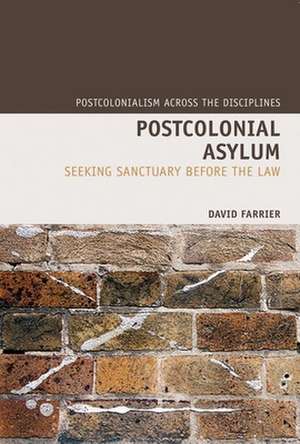Postcolonial Asylum – Seeking Sanctuary Before the Law
Autor David Farrieren Limba Engleză Hardback – 23 feb 2011
Deprived of political rights yet caught up in the law’s vested interest in portraying them as “other” to its citizens, individuals seeking asylum often experience a relationship of “inclusive exclusion” with their host nation. Concentrating on legislation, ethics, and political identity in Britain, Australasia, and the European Union, David Farrier engages in this book with asylum as an emerging postcolonial field through readings of postcolonial authors and filmmakers—including J. M. Coetzee, Leila Aboulela, and Stephen Frears—framed by the work of theorists, including Gayatri Spivak and Jacques Derrida. Postcolonial studies has typically understood displacement in terms of hybridity, and this accessible introduction represents a new direction for understanding belonging in a globalized world.
Preț: 481.17 lei
Preț vechi: 896.29 lei
-46% Nou
Puncte Express: 722
Preț estimativ în valută:
92.07€ • 100.33$ • 77.58£
92.07€ • 100.33$ • 77.58£
Carte indisponibilă temporar
Doresc să fiu notificat când acest titlu va fi disponibil:
Se trimite...
Preluare comenzi: 021 569.72.76
Specificații
ISBN-13: 9781846314803
ISBN-10: 1846314801
Pagini: 235
Ilustrații: 7 halftones
Dimensiuni: 162 x 239 x 23 mm
Greutate: 0.57 kg
Ediția:New.
Editura: Liverpool University Press
ISBN-10: 1846314801
Pagini: 235
Ilustrații: 7 halftones
Dimensiuni: 162 x 239 x 23 mm
Greutate: 0.57 kg
Ediția:New.
Editura: Liverpool University Press
Notă biografică
David Farrier is a lecturer in postcolonial literature at the University of Leicester.
Cuprins
Acknowledgements
Note to the Reader
List of Figures
Introduction: Before the Law
1. Nothing Outside the Law
2. Horizons of Perception
3. Be/held: Ban and Iteration
4. Allow Me My Destitution
5. Terms of Hospitality
6. The Politics of Proximity
Afterword
Bibliography
Index
Note to the Reader
List of Figures
Introduction: Before the Law
1. Nothing Outside the Law
2. Horizons of Perception
3. Be/held: Ban and Iteration
4. Allow Me My Destitution
5. Terms of Hospitality
6. The Politics of Proximity
Afterword
Bibliography
Index
Recenzii
“A densely theoretical yet politicised and interdisciplinary book that signals an important new trajectory in postcolonial and cultural studies, towards interrogation of the plight of those looking for sanctuary in Europe, Australia, and elsewhere. It is at its best in discussing asylum statistics and contexts, and analysing art, photography, and literature. Recommended reading, especially for policymakers and tabloid journalists.”
